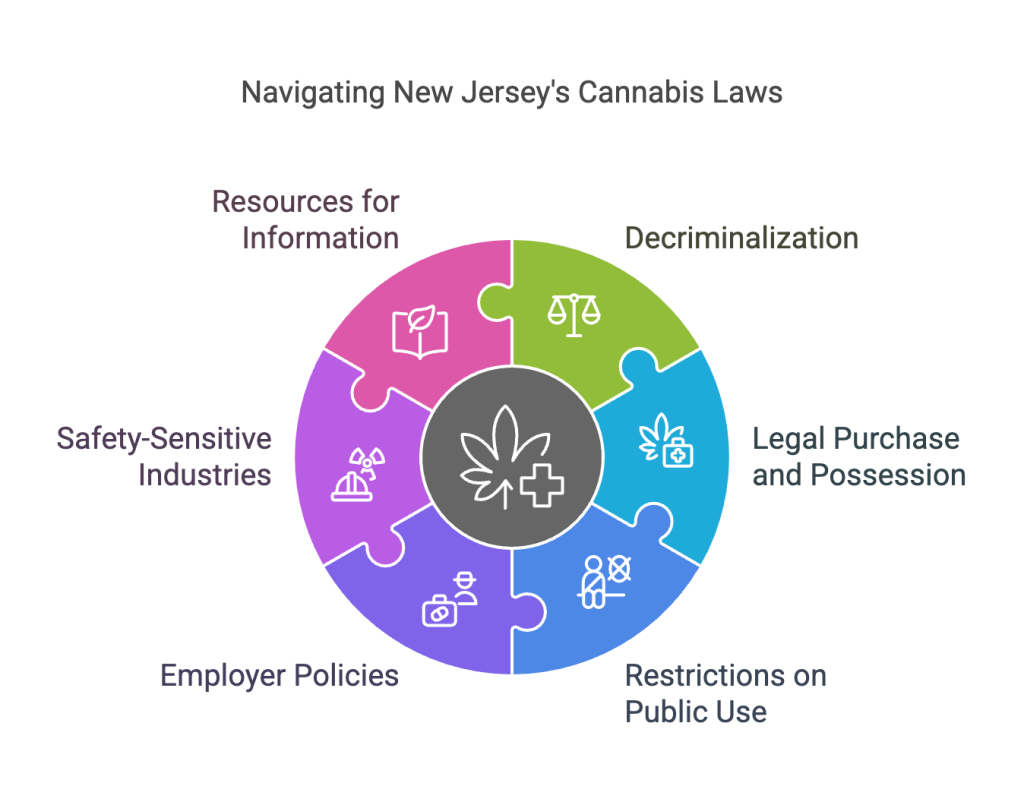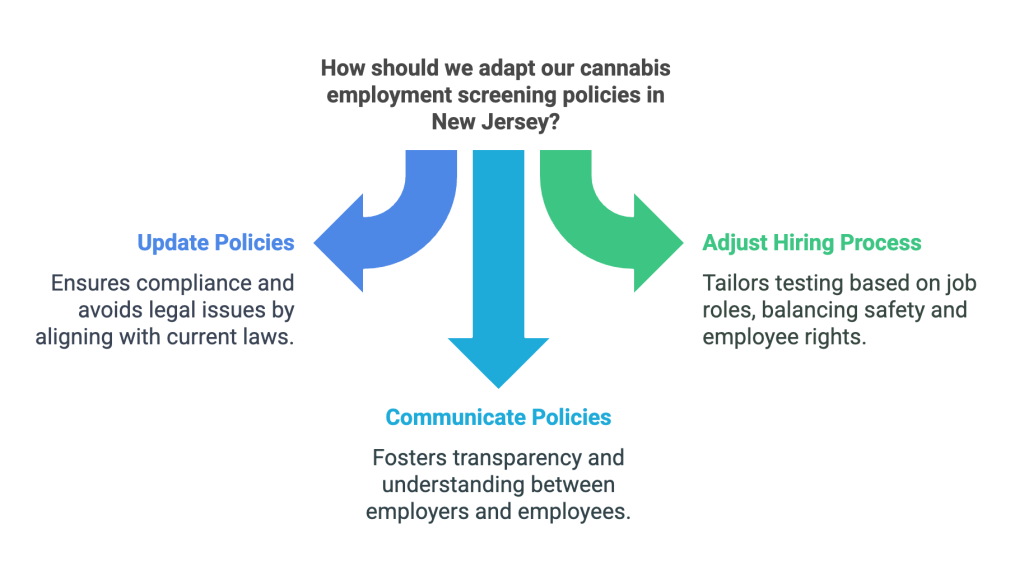With New Jersey's recent cannabis legalization, both job seekers and employers are navigating a new landscape of employment rights and drug testing policies. As more states adopt similar laws, understanding the implications of cannabis legalization on employment screening becomes increasingly vital. This guide breaks down how New Jersey's cannabis laws impact the hiring process, drug testing practices, and your employment rights.
Key Takeaways
- New Jersey legalized recreational cannabis in 2021, impacting employment rights and drug testing policies.
- Employers cannot penalize employees for legally using cannabis outside work, except in safety-sensitive roles.
- Employers should update drug policies to align with state laws, ensuring clarity on how cannabis use impacts employment.
- Job seekers need to understand company-specific drug policies and their rights regarding cannabis use.
- Employers and job seekers should stay informed about legal changes to navigate employment challenges effectively.
Introduction
New Jersey's cannabis legalization offers a fresh intersection of employment rights and drug testing policy, creating a new landscape for both employers and job seekers. Cannabis was legalized for recreational use in New Jersey in 2021, following a statewide referendum. This change came with complex implications, balancing personal freedoms with workplace safety and compliance. Understanding these shifts helps you navigate your role responsibly, whether you're hiring or seeking employment. This article examines how cannabis laws in New Jersey affect employment screening, your rights regarding THC testing, and how employer drug policies adapt to new realities.
Understanding New Jersey Cannabis Laws
New Jersey's journey to cannabis legalization began with decriminalizing small amounts for personal use in 2020. By 2021, the law expanded to permit adults over 21 to purchase and possess cannabis legally. This legislative move aligned New Jersey with a growing number of states that recognize cannabis as a legal substance.
Key provisions of New Jersey's cannabis law are crucial for both employers and employees. Adults can legally consume cannabis, but usage is restricted to private spaces. Public consumption remains prohibited. Employers cannot penalize employees for using cannabis during non-work hours, provided this use does not interfere with their performance or workplace safety.
However, challenges arise in safety-sensitive industries. Jobs involving heavy machinery, transportation, or healthcare may still impose restrictions. Employees in these sectors need to understand how these rules affect them. Companies in these fields often retain the right to establish stricter drug-use policies to ensure safety.

If you need further details, the New Jersey Department of Labor offers comprehensive resources. There, you can explore more about how these laws interact with employment rights.
Employment Rights Under New Cannabis Laws
As an employee in New Jersey, your right to use cannabis legally outside of work is protected. Recent laws make it clear that what you do in your personal time, provided it is legal, should not impact your job security. However, itâs important to navigate with care.
Cannabis use outside work hours isn't grounds for dismissal. Employers can't fire or refuse to hire you simply because you consume cannabis legally on your own time. The law helps ensure a fair playing field by adding non-discrimination clauses that protect your rights. For instance, using cannabis legally should not make you automatically ineligible for employment opportunities.
That said, there are exceptions to be mindful of. Some roles are considered safety-sensitive, such as those in transportation, healthcare, or positions that involve heavy machinery. For these jobs, employers might maintain stricter drug policies due to safety concerns. In these sectors, the use of cannabis, whether legal or not, could potentially impact your employment status.
Understanding these nuances helps you stay informed about your rights and responsibilities. Are you confident in navigating this new landscape? Ensure you're aware of your rights, and if in doubt, seek guidance to make informed decisions.
New Jersey Cannabis Employment Screening
Cannabis legalization in New Jersey has reshaped the employment screening landscape. Employers now face new challenges in aligning their drug screening policies with current laws. Here's what you need to know:
The first noteworthy change is the need for employers to differentiate between legal and illegal cannabis use. With cannabis use now lawful for adults over 21, employers must be cautious not to infringe on employees' rights. Regular updates to company policies are advisable to remain in compliance and avoid legal pitfalls.
Furthermore, consider the implications for your hiring process. While you can still test for cannabis, the context matters. For safety-sensitive positions, certain tests can still be warranted. However, for other roles, testing might need to be adjusted or potentially reconsidered.
For job seekers, these changes could impact how you present yourself during job applications. Understand your rights regarding cannabis use and be prepared to discuss drug testing policies if they arise. Employers can no longer automatically count cannabis use against potential employees, but you'll want to be clear about company-specific policies.

Adapting to these changes requires open lines of communication between employers and employees. Are your company's drug policies clear? Are they up to date with the latest regulations? These are questions worth discussing internally to create a fair and compliant work environment. Adjusting workplace screening to legal realities is not just necessaryâit's a smart way to safeguard against potential disputes and ensure a more harmonious workplace.
NJ Marijuana Legalization Hiring Process
The process of applying for a job in New Jersey has shifted with the legalization of cannabis. This shift impacts both the application process and the discussions that occur during interviews.
When you apply for a job, the application forms may no longer ask about cannabis use directly. This change reflects a broader move to separate personal legal behavior from job qualifications. Some employers are adjusting their criteria to focus on skills and experience rather than probing into legal cannabis consumption.
During interviews, the dynamic has changed too. Employers are increasingly cautious in their questioning. Where previous queries might have touched on recreational activities, interviewers now need to respect the legal landscape. The key is to focus discussions on professional capabilities and how candidates meet the job requirementsâanything else can be risky.
With conditional job offers, cannabis testing might still occur, but it comes with nuances. Employers need to balance this practice with respect for the legal rights of their candidates. It's about fairness and legal compliance. Some companies may choose to abandon testing altogether for roles that aren't safety-sensitive. Others may still consider testing but will have to clearly define their policies and ensure candidates are aware before accepting any job offer. These changes reflect a need to respect personal freedoms while maintaining organizational integrity.
Both job seekers and employers must stay informed and adaptable to navigate this evolving employment landscape.
THC Testing NJ: What to Expect
When it comes to THC testing in New Jersey, employers have a range of methods at their disposal. Urine tests are the most common. They can detect THC several days after use. Hair tests are less frequent but can reveal cannabis use over the past several months. Blood tests are rare for employment but offer a short detection window, making them less popular.
With cannabis legalization, companies should rethink their THC testing policies. Employers have to balance state laws with workplace needs. Do you need a zero-tolerance policy, or can you permit cannabis use off-duty? Tailoring your approach is key.
Employers must distinguish legal from illegal cannabis use. Testing positive doesnât mean a rule was broken. Employers focus on impairment at work, not legal use outside working hours. Make sure your policies clearly reflect this distinction.
Employer Drug Policies NJ
Crafting thoughtful drug policies is crucial for employers in New Jersey post-cannabis legalization. You should ensure your policies are updated to reflect current legal standards. Start by reviewing the existing policy framework. Make sure it complies with state law, specifically regarding legal cannabis use outside the workplace. Provide clear distinctions between prohibited and permissible conduct.
Communicating these updates effectively to your team is equally important. Clear communication prevents confusion and potential disputes. Ensure every employee, from entry-level to executive, understands the revised policies. Use company meetings, emails, and handbooks for consistent messaging. Offer open channels for discussion to address any questions or concerns.
Itâs also wise to invest in training for management. Equip them with a thorough understanding of the legal context and how it influences their responsibilities. Managers should be prepared to handle situations involving cannabis use with a fair and informed approach. This includes recognizing the rights of employees while maintaining workplace safety and productivity.
Updating your drug policy is not just a legal obligation. Itâs a step toward creating a transparent and fair workplace. As the legal landscape continues to shift, stay proactive. Regularly revisit and revise your policies to align with new developments.
Balancing Safety and Rights
Safety-sensitive industries, like construction and transportation, face unique challenges with cannabis legalization. Employers must uphold safety standards while respecting employee rights. This need for balance is paramount where the risk to public and employee safety cannot be ignored.
How do you maintain workplace safety while honoring individual rights? In these sectors, employers often adopt stricter protocols. Random drug tests are more common. But there's a catchâthese tests must align with state laws protecting off-duty cannabis use. This requires a clear, well-communicated policy that everyone understands.
Consider a construction company. They might require fitness-for-duty assessments before operating heavy machinery. Positive THC results necessitate a nuanced approach. Simply relying on standard tests can be tricky since THC can remain in one's system without affecting immediate capabilities. Some leverage impairment assessments that evaluate behavior rather than relying solely on test results.
Are there exceptions? Yes, in high-risk roles, employee agreements might include stricter cannabis use clauses. Employers need to craft policies that delineate these expectations clearly.
For employees, understanding your rights is essential. Know when and how you can be tested. Keep informed about your employer's policies. They need to be as transparent as they are compliant.
Balancing safety and rights involves ongoing dialogue. Employers and employees must adapt to evolving regulations. Open communication fosters a safer and more respectful workplace. How will you approach this balance in your organization?
Practical Advice for Job Seekers and Employers
For job seekers in New Jersey, it's crucial to understand that while cannabis use is legal, it can still affect your employment. Know your rights: employers can't discriminate based on off-duty legal cannabis use, but roles affecting safety may have stricter screening. When applying, be aware of the company's drug policiesâthese are often outlined during the application process or interview. Always approach these topics with transparency and honesty when speaking with potential employers.
Employers, on the other hand, need to update their drug policies to reflect the changes in state law. It's vital to clearly communicate these policies to current and prospective employees. When reviewing or crafting your policies, ensure they are compliant with state regulations and fair to your workforce. Consider offering education sessions to address any questions your employees might have.
Seek legal advice when uncertain about implementing these changes. Understanding the nuances of the law helps avoid potential legal pitfalls and fosters a supportive environment. Balancing compliance with maintaining safety and employee rights will be imperative as the legal cannabis landscape evolves.
Conclusion
New Jersey's cannabis legalization presents both challenges and opportunities for employers and job seekers. Understanding the landscape ensures informed decisions, compliance, and protection of rights. The key lies in adapting to these legal shifts while maintaining a safe workplace.
New regulations require employers to adjust their drug policies while respecting employees' rights to legal cannabis use outside work. Companies must create clear policies that balance safety with privacy. Job seekers should understand these policies and how they impact hiring.
Both parties should engage with trusted resources, legal experts, and industry updates. This proactive stance helps navigate the evolving landscape, providing clarity and safeguarding interests. For a comprehensive understanding, explore the GCheck blog for more insights and updates.
Frequently Asked Questions (FAQs)
Can NJ employers test for cannabis?
Yes, employers in New Jersey can test for cannabis. However, post-employment testing must be accompanied by physical evaluation to ensure a fair assessment if impairment is suspected.
Are off-duty cannabis users protected in NJ?
Yes, off-duty cannabis users are protected under New Jersey law. Employers cannot take adverse employment actions based solely on an employeeâs legal off-duty cannabis use.
Can you be fired for a positive THC test in NJ?
A positive THC test alone does not automatically justify firing unless there is evidence of impairment during work hours or a safety concern. The specific context of the job will matter.
Do NJ employers have to ignore past marijuana charges?
Yes, New Jersey employers are required to disregard criminal records related to certain decriminalized marijuana offenses due to expungement laws.
How to update drug policies for NJ compliance?
Revise policies to distinguish between THC presence and actual impairment. Consult legal experts to ensure alignment with state laws. Train management on new rules and grey areas.
Are safety-sensitive jobs exempt in NJ?
Yes, employers in safety-sensitive positions like transportation or operating heavy machinery can enforce stricter testing rules even in the presence of state protections for cannabis use.
Can dispensary workers fail background checks in NJ?
Potential dispensary employees cannot be disqualified solely based on past marijuana-related charges. However, other felony convictions could still impact eligibility.
Does NJ expunge old cannabis convictions?
Yes, New Jersey expunges certain cannabis-related offenses. This means eligible convictions will be erased from public records, providing a clean slate.
Are out-of-state medical cards recognized in NJ?
New Jersey recognizes out-of-state medical cannabis cards for temporary use. However, patients need to register with New Jersey's medical program if they stay longer.
How to handle positive tests for NJ remote workers?
For remote workers, consider only taking action if there's evidence of work impairment. Be clear on policy stipulations during onboarding.
Can employers discipline employees for cannabis consumption at work?
Yes, employers can enforce discipline for consuming cannabis during work hours. Workplace policies should clearly communicate these rules.
What should you do if you suspect an employee is impaired at work?
Conduct a physical evaluation in conjunction with any drug testing. Ensure documentation and follow proper procedural protocols aligned with company policies.
Is it legal for employers to reject job applicants who use cannabis?
Without evidence of impairment or specific job-related concerns, rejecting applicants solely for cannabis use might violate New Jersey law.
How does NJ handle cannabis use by federal employees?
Federal employees in New Jersey must adhere to federal regulations, which prohibit cannabis use. Federal law supersedes state protections in these cases.
Definitions
Employment Screening
Employment screening refers to the process employers use to evaluate a candidateâs background before hiring. This can include checking criminal records, verifying previous employment, and conducting drug tests. In New Jersey, cannabis legalization means employers must now carefully design these screeningsâespecially for roles that are not safety-sensitiveâto avoid discrimination based on legal off-duty cannabis use.
Drug Policy
A drug policy outlines how an employer manages substance use in the workplace. It sets the rules for testing, consequences for violations, and expectations for employee behavior. In New Jersey, these policies must reflect the legal status of cannabis, distinguish on-duty impairment from legal off-duty use, and be clearly communicated to all staff.
Safety-Sensitive Position
A safety-sensitive position is any job where impairment could put people at risk. Examples include truck drivers, construction workers, and medical staff. Employers can enforce stricter cannabis rules for these roles, including regular testing and fitness-for-duty evaluations, to ensure workplace safety.
Non-Discrimination Clause
A non-discrimination clause is a written part of employment law or policy that protects individuals from unfair treatment in the workplace. In the context of New Jersey cannabis laws, it means employers canât fire or refuse to hire someone just because they use cannabis legally during their personal time, as long as it doesnât interfere with job performance or safety.
Conditional Job Offer
A conditional job offer is a promise of employment that depends on meeting specific criteriaâsuch as passing a background check or drug test. In New Jersey, employers may still test for cannabis after making a conditional offer, but must apply their policy legally and fairly, especially for roles that donât involve safety concerns.
References
- Rutgers Policy Lab Baseline Study: https://policylab.rutgers.edu/wp-content/uploads/2022/02/NJSPL-Cannabis-Feb2022.pdf
- Seton Hall Law Review - Employee Cannabis Screening: https://scholarship.shu.edu/cgi/viewcontent.cgi?article=2314&context=student_scholarship
- PMC - Workplace Cannabis Policies: https://pmc.ncbi.nlm.nih.gov/articles/PMC8864412/
- NAAG - The Effects of Marijuana Legalization on Employment Law: https://www.naag.org/attorney-general-journal/the-effects-of-marijuana-legalization-on-employment-law/

GCheck Editorial Team
Meet the GCheck Editorial Team, your trusted source for insightful and up-to-date information in the world of employment background checks. Committed to delivering the latest trends, best practices, and industry insights, our team is dedicated to keeping you informed.
With a passion for ensuring accuracy, compliance, and efficiency in background screening, we are your go-to experts in the field. Stay tuned for our comprehensive articles, guides, and analysis, designed to empower businesses and individuals with the knowledge they need to make informed decisions.
At GCheck, we're here to guide you through the complexities of background checks, every step of the way.






